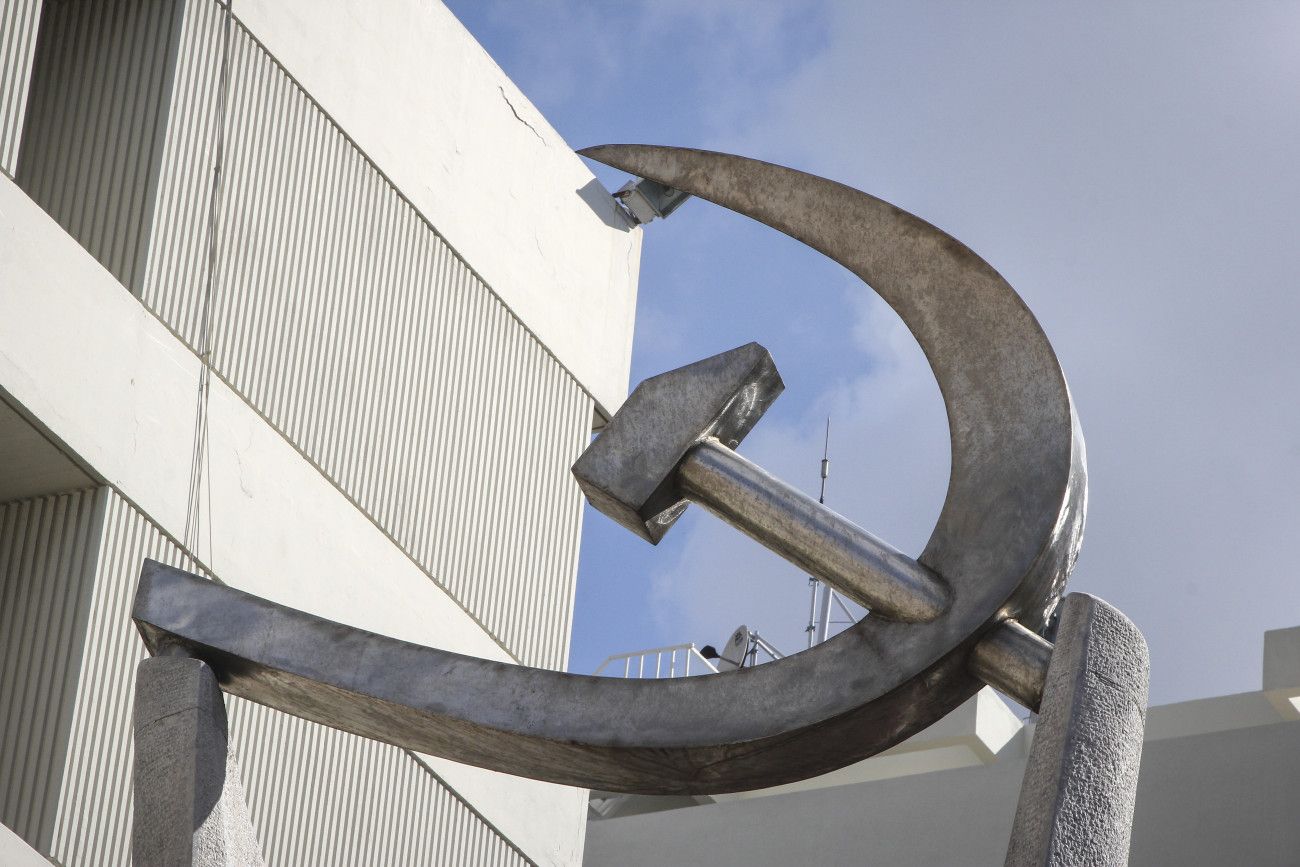Setbacks? No, Trump continues full
/s3/static.nrc.nl/images/gn4/data133009942-8ac92b.jpg)
How do you undermine a court ruling that undermines one of the spearheads of your policy? You discredit the judges, is the response of the Trump government. In statements against journalists and on social media, a number of Trumps leading employees were ruthless about three judges of the Court of International Trade.
These judges had put a spoke in the wheel on Wednesday with a unanimous ruling in the strategy to force other countries into strong concessions in negotiations through extremely high levies. For example, Trump’s trade deficits abhorred by Trump should disappear.
Chef Staff of the White House Stephen Miller wrote on social media « We live under a judicial tyranny » and thereby shamelessly posted a photo of the three judges. Two of these judges were appointed by Republican presidents, one even by Trump, in his first term.
Spokesperson Katherine Leavitt expressed himself just as critically about the judges, emphasizing that they are « unclassified. » The three judges of the International Trade Court had « brutally abused their judiciary, » she told journalists. « They undermined the authority of the president by preventing him from carrying out the mandate that he has received from the American voters. »
The president himself reported on his social medium Truth Social: « The ruling of the Court of Appeal is so wrong, and so politically! Hopefully the Supreme Court will revise this terrible, threatening decision quickly and determined. »
Fury
With his Make America Great Again ambitions, Trump wants to hold all the strings himself. Since his appointment, the president has tried to put on other countries to impose import duties all the way. But the right is the right to take trade measures, just like imposing taxes, not with the president, but at the congress. That underlined these three judges with their pronunciation.
They aroused the anger of the government because they dared to pull the legal basis away under the high – in Trumps words « reciprocal » taxes of 10 to almost 50 percent that he announced on 2 April for more than sixty countries with a lot of bombing in the rose garden of the White House. A week later he proposed the levy for those countries for ninety days up to 10 percent for all goods, in order to make negotiations as possible until 8 July. And thus to be able to conclude similarities in which he could force them to strong concessions.
He therefore went far beyond his powers, the judges ruled. According to them, this also applies to the rates of 25 percent that Trump imposed on Canada, Mexico and China, to force them to do more to prevent illegal transit of the addictive fentanyl to the US.
Trump based these two measures on a law that had never been applied since the entry into force in 1977, the International Emergency Economic Powers Act (IEEPA). This law allows the president to impose taxes in an emergency situation in exceptional circumstances. But, according to the Court of Appeal for International Trade, he should not have used that law for the purpose that he strives for, reducing the trade deficits sharply. A federal court in Washington DC had recently come to that conclusion. This week, the Court of Appeal gave the government ten days to withdraw the taxes. To the anger of Trump and his government, who immediately appealed and stated that the negotiating position is seriously undermined.
Read also
https://www.nrc.nl/nieuws/2025/05/29/een-american-rechtbank-fluit-trumps tax policy-part-back-wat-nu-a4895031
They already achieved the first success on Thursday. The operation of the decision was suspended by the Court of Appeal. Until a moment to be determined later.
That does not say anything about how this court looks at the case in terms of content. If those judges keep the ruling up, the government will certainly go to the Supreme Court. In it, conservative judges appointed by Republican presidents have a large majority, with three judges appointed by Trump himself. Yet it is not at all certain whether they consider the use of the ieepa permitted.
Not surprised
The statements from Leavitt, Miller and Trump could be seen as desperate after a sensitive loss. But the Trump government does not seem to panic. On the contrary, she makes it clear that she will continue to be full, does not allow herself to be prevented by judges, keeps sufficient alternatives behind and will continue to put pressure on negotiations.
Trumps important adviser for trading policy, Peter Navarro, tried to make it clear on Thursday in interviews that nothing has changed for the government because of the statement. « We are not surprised, » he said. This also indicates the speed with which the government scored an appeal. Already within an hour after the ruling.
But he is also not sure whether the profession at the Supreme Court will be successful. And so Navarro alluded that Trump has other legal options for imposing taxes without the intervention of the congress. He stated that the judges of the Court of Appeal for International Trade that had indicated themselves in their ruling.
Various experts have previously pointed out those possibilities in analyzes. Because although the privilege lies with the congress, this has given the president opportunities through various laws in the past centuries to conduct trading policy on his own initiative and to take measures against other countries without consent.
Trump has already used this. For example, the 25 percent levies for steel, aluminum, cars and car parts are based on another law, on the so-called section 232 of the Trade Expansion Act from 1962. For example, chips and pharmaceuticals are prepared based on that law. Trump could also choose that route for other sectors. Trump can also opt for taxes that are even more specifically tailored to one country, as he has already done for China in his first term. Just like President Biden after him, he based taxes on section 301 of the Trade Act from 1974.
For a president who wants to make great speed, these possibilities have the big disadvantage that it must first be investigated whether national security is at stake or that it is unfairly competing. On the day of his announcement, Trump already promised the Americans that he would quickly impose on other countries to destroy trade shortages. His team then investigated the various routes and chose the IEEEPA, because it would be the most pace.
To keep pressure on the now -current negotiations, the White House would therefore be The Wall Street Journal In a plan B Consider another alternative. Trump can also set temporary levies with a height of 15 percent for a period of 150 days to combat imbalances in the trade with other countries. After that, these can only be extended with the consent of the congress. This road has been followed more often, and would encounter fewer objections from judges.
In an interview with Bloomberg TV, Navarro also mentioned the opportunity to appeal to the S) Hawley Tariff Act from 1930, the law that was greatly known because it heralded the trade war during the great depression. According to him, Trump could make use from a provision in that law that gives the president the right to impose taxes on countries that disadvantage the US towards other countries.
Yet there are also risks when Trump switches to other laws to base his taxes on. In American media, some lawyers state that a change in tactic can give the impression that he himself does not believe that the elmpa is the appropriate way. The Court of Appeal or the Supreme Court would then be able to maintain the decision of the Court of Appeal for International Trade. That would again require the government to cause caution.
Pessimistic sounds
Negotiators of the US and of all countries they have conversations with, have had less solid ground since this week. Threats such as Trump, who expressed a week ago, waving the EU with an increase in the levy to 50 percent, seem a lot harder for him. The willingness of other countries to make concessions could therefore decrease.
For other countries, it would be a big gamble to just wait and see if Trump can keep his taxes upright. The determination and the use of his government are so great in this trade war that they can assume that he will take every possible way. In addition, he continues to play that he has several goals with his taxes: generating income for the treasury, retrieving industry to the US and minimizing the trade deficit.
It is therefore striking that both the US and other countries have emphasized in recent days that the negotiations will continue. The American trade representative Jamieson Greer announced on Friday that he had agreements next week with European Commissioner Mario Sefcovic and with ministers from various Asian countries.
Only about the conversations with China did the Americans brought out pessimistic sounds. First Minister of Finance, Scott Bessent, Fox News Knowing that they « got stuck a little bit » and that only a conversation between Trump and Chinese President Xi could smooth them again. On Friday, Trump put a shovel with a post on Truth Social by saying that « China has violated the agreement with us. So much for being Mr. Nice Guy ».
All in all, the playing field this week has become more unclear. Countries, companies and financial markets remain in the uncertainty that is paralyzing on economic decisions. And that period of uncertainty will probably only take longer.

:format(webp)/s3/static.nrc.nl/wp-content/uploads/2025/05/28143839/web-3105ZAT_LEV_giro_algemeen_2.jpg)
:format(webp)/s3/static.nrc.nl/images/gn4/stripped/data74060444-16bfe3.png)
/s3/static.nrc.nl/wp-content/uploads/2025/06/01170719/web-0106SPOverstappen.jpg)



